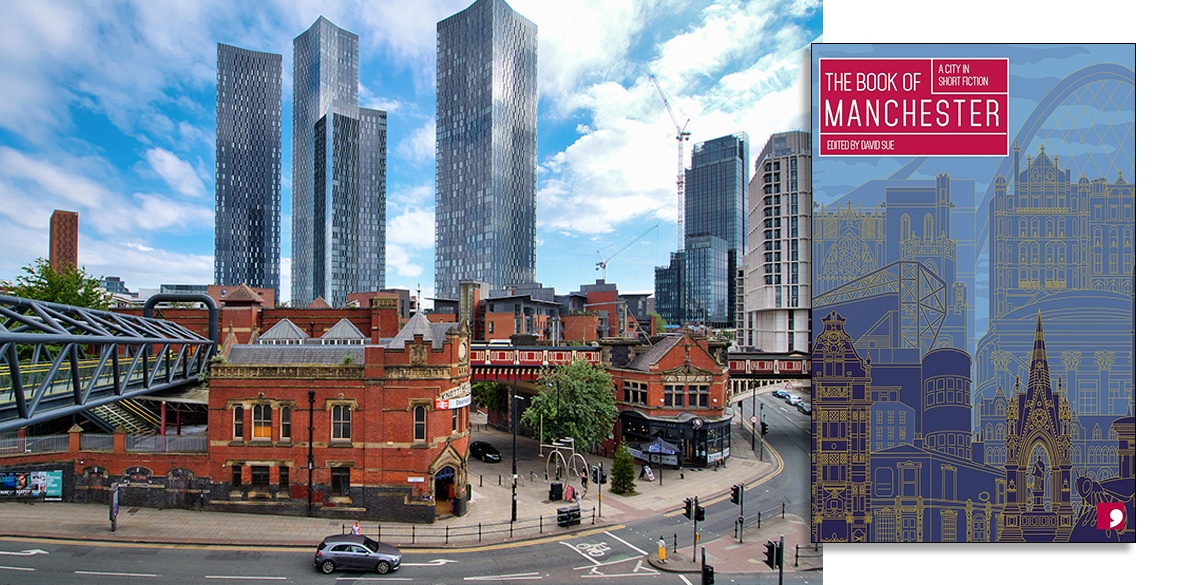This is the last article you can read this month
You can read more article this month
You can read more articles this month
Sorry your limit is up for this month
Reset on:
Please help support the Morning Star by subscribing here
The Book Of Manchester: A City In Short Fiction
Edited by David Sue, Comma Press, £10.99
“A few stops before town she came down with her nose in her handbag, after a cig. She got off and stayed at the stop awhile, cupping her hands to light up. When she crossed he leapt off at the last second and followed her to Hulme, keeping her well ahead. Between them were bikes, prams, old biddies hunched in saris bobbing into the greengrocers, skinny Jamaicans leaning outside a café... A line of big lads gave him f***off stares and he walked in the road to get by.”
Tom Benn’s description of an obsessive son following his mother into her secret life pulls focus on a city teeming with stories.
It is one of a dozen pieces on the great northern metropolis brought together in this compendium from Comma Press. With its back-story of gothic ambition, industrialised slavery to dark Satanic mills, protest movements and insurgent music scene, Manchester arrives ready-branded for the imagination. Updating the story, twelve writers conjure contemporary life against a backdrop of poverty, crime and excess.
In The Cat’s Mother, Benn’s screenwriter approach shows the cycle of hard knocks playing through a conjoined terrace house in Portway throbbing with a soul music soundtrack.
Home is the problematic, threaded through these stories as their central theme: more than inadequate housing, this is about the impossibility of producing habitable space in a neoliberal property goldrush.
Occupy Manctopia by Mish Green sees a pair of homeless desperadoes collaborate to set up a protest movement in a squatted office building. Here the “arterial flow of money from untaxed investment funds to the edge of Hulme” is examined – “Mate, Manchester’s a genocide bank,” a character says. The Manchester of abandoned factories, empty canals, castellated stations for broken-down trains is pitted against shell company registrations in Kuwait, the Caymans and British Virgin Islands. Vulture-funds spawn a “skyline full of cranes.” On the ground: “every doorway with a sleeping bag.”
Okechukwu Nzelu’s The Headteacher reveals the exchange value dynamic from the homegrown side. An ageing gay couple host a retirement party for Mathew attended by former students from his state-turned-academy school. The story shows Mathew’s progress from overworked and underpaid committed teacher, to highly paid Academy Trust CEO, investing his prosperity in nest-egg housing stock. “And the flats would make good money,” Mathew’s partner muses on their portfolio. “One of them had a shower that needed fixing, as soon as enough rent revenue built up for it to be worthwhile.”
This story deftly shows the exchange of moral values when a former pupil of Mathew’s, now a theatre nurse, turns out to be a subletting tenant of theirs.
The Book of Manchester wears its cultural heritage lightly. Abduction, a story from the great and much missed Shelagh Delaney, is a reminder of the Northern talent bank which gave Britain its post-war new writing, celebrated world-wide through films such as Delaney’s A Taste of Honey.
Another strong female voice is Bronte Schiltz. Her Contents May Vary expresses a lifetime in a three thousand word love story. While Reshma Ruia’s Soul Sisters shows the erosion of cultural history leaving a woman alienated from her own identify and sense of place – “Sometimes she felt the city had grown taller and left her smaller.”
The Book of Manchester is a riposte to the advancing armies of developers, estate agents, private capital speculators and their marketeers. It is writing from the core of a great historical city, calling up human lives from beneath the shadows of luxury tower blocks “springing up like magic mushrooms in Deansgate Square and Castlefield.”







